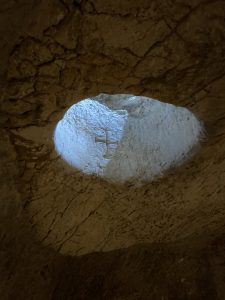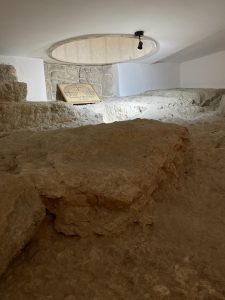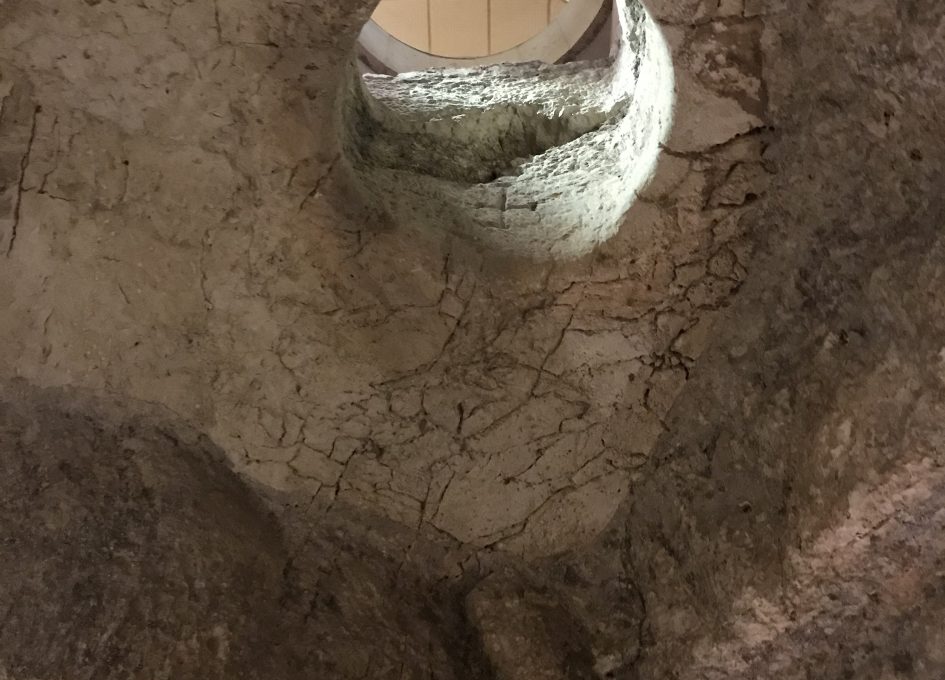I waited patiently for the Lord to help me, and he turned to me and heard my cry. He lifted me out of the pit of despair, out of the mud and the mire. He set my feet on solid ground and steadied me as I walked along. He has given me a new song to sing, a hymn of praise to our God. Many will see what he has done and be amazed. They will put their trust in the Lord.
You take no delight in sacrifices or offerings. Now that you have made me listen, I finally understand—you don’t require burnt offerings or sin offerings. Then I said, “Look, I have come. As is written about me in the Scriptures: I take joy in doing your will, my God, for your instructions are written on my heart.” I have told all your people about your justice. I have not been afraid to speak out, as you, O Lord, well know.
I have not kept the good news of your justice hidden in my heart; I have talked about your faithfulness and saving power. I have told everyone in the great assembly of your unfailing love and faithfulness. Lord, don’t hold back your tender mercies from me. Let your unfailing love and faithfulness always protect me.
For troubles surround me—too many to count! My sins pile up so high I can’t see my way out. They outnumber the hairs on my head. I have lost all courage. Please, Lord, rescue me! Come quickly, Lord, and help me. May those who try to destroy me be humiliated and put to shame. May those who take delight in my trouble be turned back in disgrace. Let them be horrified by their shame, for they said, “Aha! We’ve got him now!”
But may all who search for you be filled with joy and gladness in you. May those who love your salvation repeatedly shout, “The Lord is great!” (Psalm 40 – selected verses, New Living Translation)
The Psalms make up the songs and prayers of the people of God. My colleague and friend, Joan Wooden, loves to say the psalms are the prayer songs of Jesus. He knew these words for they were more than bits of poetry, they were cries of a people seeking God. Beautiful? Yes, but more than something artistic, they are real exchanges between God and the people. They are raw and dark at times. Other psalms are uplifting and invite us to pray them out on tippy-toes. The psalms are a gorgeous window into the soul of one who wants to encounter God.
As I write these words, we are beginning Holy Week. It began on Saturday as Jesus ate supper with his friends and as his feet were anointed with the life-savings of Mary. The next morning, with the fragrance still lingering in the air and on the Messiah, Jesus rode on a donkey down the pilgrims path as the crowds celebrated. They waved palms and placed branches on the ground, and they sang the hallel songs – the songs of praise.
From this triumphal entry, Jesus would cleanse a temple, challenge religious authorities and offer hope to any who sought it. But then, on Thursday the week of celebration took a different tone. In an upper room, he offered them a new covenant. On the mount of olives, he prayed for rescue. An hour later, he was betrayed with a kiss and led away – “a sheep to its slaughter.”
In the house of the High Priest, Jesus was accused, tried, convicted and beaten by those entrusted with the righteousness of Israel. Holy men chose violence and ridicule as their liturgy. It was an ugly night and when they finally tired of their attacks they rested. Tradition tells us, Jesus was placed into a cistern below the high priest’s house. A rope was tied under his arms and he was lowered into a hole in the ground – into the darkness of a pit.
This psalm, this prayer, is set aside as a Psalm for holy week. It begins with songs of thanksgiving for rescue. It speaks of great trust and the works of God. The author has found that sacrifices and holy actions unaccompanied by a heart turned to God are worth very little. But even with a life of uprightness, this author sees the evils surrounding him, they have encompassed him. His heart fails and a prayer of deliverance is once again offered. In the end, God is still his help and deliverer.

In Jerusalem, there is a church that is believed to have been the home of the high priest, Caiaphas. The church depicts the trials and humiliation of Jesus. In the courtyard is a statue of Peter’s denial and roosters, reminding every pilgrim of Peter’s words and Jesus’ prediction, are everywhere. Below the church is a basement that appears to have been a prison. And to the side of this prison is a cistern. Today, steps have been etched into the side and you can safely climb down into this pit. It is a sobering spot to feel the weight of the space.
There is another Psalm that he may have prayed in that pit. Psalm 88 is often entitled a song to be sung to the tune “the suffering of affliction.”
Psalm 88 (selected verses)
3 My soul is deeply troubled, and my heart can’t bear the weight of this sorrow. I feel so close to death. 4 I’m like the poor and helpless who die alone, left for dead, as good as the unknowable sea of souls lying under our feet,

8 Those whom I have known, who have been with me, You have gathered like sheaves and cast to the four winds. They can’t bear to look me in the eye, and they are horrified when they think of me. I am in a trap and cannot be free.
9 My eyes grow dim, weakened by this sickness; it is taking my strength from me. Like a worn cloth, my hands are unfolded before You daily, O Eternal One.
13 But I am calling out to You. Eternal One, my prayers rise before You with every new sun! 14 Why do You turn Your head and brush me aside? Why are You avoiding me? (The Voice translation)
Were these the songs of Jesus when he was in a pit? Were these the prayers he offered up after betrayal and rejection? He still had much to accomplish before it would be finished. Would these songs be what sustained him as he stood before Pilate and Herod, as he was flogged and crucified?
We know Jesus prayed one further psalm that Holy Week. The Gospel of Matthew says that at 3 pm, Jesus cried out with a loud voice “Eli, Eli, lema sabachthani – which means my God, my God why have you abandoned/forsaken/left me all alone.” These were cries from his heart, but each of these cries were also cries of trust. The psalms, even the songs of lament, often still point to trust and hope in God. Psalm 22 was Jesus’ last prayer from his prayer book – and it ends, not in desolation, but in hope.
Whether in the pit or on the cross, as Jesus agonized and as he felt such utter loneliness and isolation – lying beneath is the opportunity for deliverance…for salvation…for resurrection.
Here in this great gathering for worship I have discovered this praise-life. And I’ll do what I promised right here in front of the God-worshipers. Down-and-outers sit at God’s table and eat their fill. Everyone on the hunt for God is here, praising him. “Live it up, from head to toe. Don’t ever quit!”
From the four corners of the earth people are coming to their senses, are running back to God. Long-lost families are falling on their faces before him. God has taken charge; from now on he has the last word.
All the power-mongers are before him—worshiping!
All the poor and powerless, too—worshiping!
Along with those who never got it together—worshiping!
Our children and their children will get in on this as the word is passed along from parent to child. Babies not yet conceived will hear the good news—that God does what he says. (Psalm 22 – the Message)
It’s Holy Week, remember. Sit. Be Still. But always know, with every Maundy Thursday, Good Friday and Silent Holy Saturday…there is Easter. Grace and Peace
Podcast: Play in new window | Download
Subscribe: RSS


1 comment
Over the years I have read and heard sermons relating to Jesus’ crucifixion, but I never heard the part of Jesus being bound with rope and lowered into a cistern! You described this as very real having experienced this place first-hand on your trip to the Holy Land.